With more than 1,150 participants from 47 nations, the XXIst EFMC-International Symposium on Medicinal Chemistry (ISMC 2010), held at the Brussels meeting centre SQUARE from September 5-9, 2010, has been a very successful symposium with a diverse and high quality program.
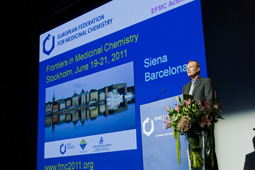 ISMC 2010 was jointly organized by the Medicinal and Bioorganic Chemistry Division of the Royal Flemish Chemical Society (KVCV) and by the Medicinal Chemistry Division of the Société Royale de Chimie (SRC), on behalf of the European Federation for Medicinal Chemistry (EFMC).
ISMC 2010 was jointly organized by the Medicinal and Bioorganic Chemistry Division of the Royal Flemish Chemical Society (KVCV) and by the Medicinal Chemistry Division of the Société Royale de Chimie (SRC), on behalf of the European Federation for Medicinal Chemistry (EFMC).
The opening ceremony, led by Dr Edmond Differding (formerly with UCB) and Prof. Koen Augustyns (University of Antwerp), symposium chairmen, and Prof Gerhard Ecker (University of Vienna), EFMC President, was the start of a five day symposium with many scientific highlights. With an introduction to IMI, the Innovative Medicines Initiative Joint Undertaking (IMI JU), by Prof. Michel Goldman (Executive Director of IMI, Belgium), the tone was set for what became a successful symposium with about 100 speakers, more than 500 poster presentations, 50 exhibitors and 30 sponsors.
The three prestigious biennial EFMC Awards were also conferred during the opening ceremony by EFMC President Prof. G. Ecker:
- the winner of this year’s “Nauta Award for Pharmacochemistry” was Prof. Camille G. Wermuth (Université Louis Pasteur Strasbourg and Prestwick Chemicals) for his significant contribution to the science of medicinal chemistry, both by scientific achievements and by educational activities. Prof. Wermuth contributed to the development of three marketed drugs and the results of his work are documented in more than 250 publications and 60 patents.
- the “UCB-Ehrlich Award for Excellence in Medicinal Chemistry” was granted to Dr. Anthony Wood from Pfizer Global Research for his instrumental role in the discovery of Maraviroc, the first small molecule antagonist of the CCR5 receptor marketed for the therapy of HIV infections. Maraviroc represents the first successful advancement of a chemokine receptor modulator to the market and for the first time provided an antiviral therapy that targets a host protein rather than a viral protein.
- the “Prous Institute - Overton and Meyer Award for New Technologies in Drug Discovery” was given to Prof Klaus Müller (ETH Zürich) for his pioneering work in the field of computer assisted molecular modeling and for his seminal contributions to the understanding of multipolar interactions and fluorine effects in protein-ligand interactions. Prof. Müller has been instrumental in implementing and further developing computational techniques for use in the drug discovery and development process both through his leading role in pharmaceutical industry and his teaching activities in academia.
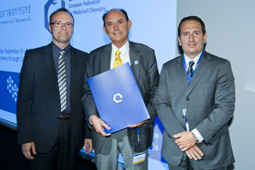 Additionally, ISMC 2010 welcomed Dr Arun K. Ghosh, the recipient of the “IUPAC-Richter Prize in Medicinal Chemistry”. He received this award in recognition of his outstanding use of structure-based design of HIV-1 protease inhibitors using his novel concept of “backbone binding” to withstand drug resistance. This work produced the novel drug Darunavir which was approved by the FDA in 2006 as the first treatment for multidrug resistant HIV. He has also pioneered structure-based design of β-secretase inhibitors for treatment of Alzheimer’s disease. One such compound has now entered into advanced clinical trials.
Additionally, ISMC 2010 welcomed Dr Arun K. Ghosh, the recipient of the “IUPAC-Richter Prize in Medicinal Chemistry”. He received this award in recognition of his outstanding use of structure-based design of HIV-1 protease inhibitors using his novel concept of “backbone binding” to withstand drug resistance. This work produced the novel drug Darunavir which was approved by the FDA in 2006 as the first treatment for multidrug resistant HIV. He has also pioneered structure-based design of β-secretase inhibitors for treatment of Alzheimer’s disease. One such compound has now entered into advanced clinical trials.
Furthermore, on occasion of ISMC 2010 the newly created “EFMC Prize for a Young Medicinal Chemist in Industry” and the “EFMC Prize for a Young Medicinal Chemist in Academia” were conferred for the first time. Dr. Antonio Nardi (Grünenthal) and Dr. Andreas Bender (Leiden/Amsterdam Center for Drug Research), have been honoured for their outstanding achievements related to drug discovery research.
Three plenary lectures were among the highlights of the program:
- Prof. Sir Tom Blundell from University of Cambridge presented a lecture entitled “Genomes, Structural Biology and Drug Discovery: New Challenges from Difficult Targets and Neglected Diseases” to emphasize how the increasing knowledge emerging from genomics of man and pathogens and from biochemical and structural proteomics programs may accelerate the drug discovery, and where we stand in the practical implementation of these novel information in medicinal chemistry approaches.
- the second plenary lecture was entitled “A Chemical Approach to Controlling Cell Fate”, presented by Prof. Sheng Ding from Scripps Research Institute. During the lecture, Prof. Ding highlighted the findings from his discovery efforts to advance the ability to control stem cell fate, survival, differentiation and reprogramming of pluripotent stem cells.
- the closing lecture was given by Prof. Greg Verdine from Harvard University, on ‘Drugging the Undruggable’. Given the fact that an estimated 80-90% of all potential targets are undruggable by classical approaches, his group has developed a new chemistry-based platform, relying on “synthetic biologics” such as hydrocarbon-stapled alpha-helical peptides that are capable of targeting large flat surfaces, while at the same time remaining fully synthetic and therefore modifiable at will.
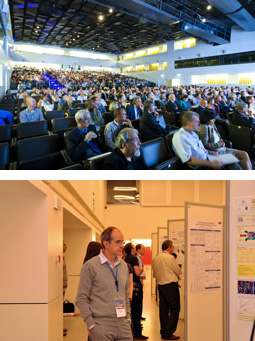 Over four days, the participants attended a busy program with 29 sessions, and 3 poster sessions, which covered drug discovery advances in all major therapeutic areas, as well as the most recent advances in lead identification and optimization strategies, in drug design and development, and in prediction of activity as well as of adverse effects. An emphasis was on first time disclosures, emerging drugs and emerging technologies, including nanotechnologies and the chemical modulation of stem cells. ISMC 2010 also illustrated the impact of the omics and biomarker areas on the interfaces between chemistry, informatics, biology and experimental medicine.
Over four days, the participants attended a busy program with 29 sessions, and 3 poster sessions, which covered drug discovery advances in all major therapeutic areas, as well as the most recent advances in lead identification and optimization strategies, in drug design and development, and in prediction of activity as well as of adverse effects. An emphasis was on first time disclosures, emerging drugs and emerging technologies, including nanotechnologies and the chemical modulation of stem cells. ISMC 2010 also illustrated the impact of the omics and biomarker areas on the interfaces between chemistry, informatics, biology and experimental medicine.
Many presentations illustrated the developing changes in the drug discovery process since it has become a highly multi- and interdisciplinary endeavor within only a few decades, leading to continuous development of new technologies and novel concepts in many areas of chemistry, biology, biophysics, molecular pharmacology as well as bioinformatics.
Some of the presentations especially from industrial speakers clearly illustrated the fact that chemical databases provided - and will keep providing - increasingly important support for drug discovery research. In addition, some presentations also demonstrated that an increasing application of spectroscopic tools through molecular imaging also offers a powerful approach for dissecting biological pathways and identifying novel therapeutic targets. However, at end of the meeting, there could be a message that finding synthetic small (or even larger) molecules that affect cellular function, and identifying their molecular targets, will remain the key challenge in drug discovery.
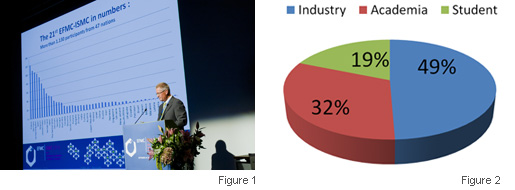
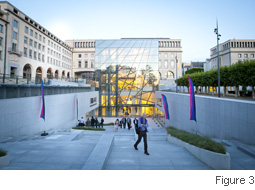 ISMC 2010 has attracted participants from all over the world. The top twenty list of numbers of delegates per country is shown in Figure 1. A distribution of the delegates according to their affiliation (Figure 2), shows that there was almost a 1:1 ratio of medicinal chemists and researchers from industry (49%) and academia (32% faculty, 19% students). The congress venue “SQUARE”, Brussels’ fully renovated conference centre, offered state of the art facilities for speakers, exhibitors and participants (Figure 3).
ISMC 2010 has attracted participants from all over the world. The top twenty list of numbers of delegates per country is shown in Figure 1. A distribution of the delegates according to their affiliation (Figure 2), shows that there was almost a 1:1 ratio of medicinal chemists and researchers from industry (49%) and academia (32% faculty, 19% students). The congress venue “SQUARE”, Brussels’ fully renovated conference centre, offered state of the art facilities for speakers, exhibitors and participants (Figure 3).
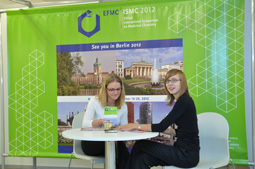 The next edition of this biennial symposium will take place in 2012 in Berlin, Germany and will be jointly organized by the Division of Medicinal Chemistry of the German Chemical Society (GDCh) and the Section of Pharmaceutical/Medicinal Chemistry of the German Pharmaceutical Society (DPhG). ISMC 2012 will continue the tradition of the ISMC Symposia to create an international platform where scientists from all over the world meet and exchange their view and ideas. The first details can be found on the regularly updated symposium website www.ismc2012.org or via the EFMC website www.efmc.info
The next edition of this biennial symposium will take place in 2012 in Berlin, Germany and will be jointly organized by the Division of Medicinal Chemistry of the German Chemical Society (GDCh) and the Section of Pharmaceutical/Medicinal Chemistry of the German Pharmaceutical Society (DPhG). ISMC 2012 will continue the tradition of the ISMC Symposia to create an international platform where scientists from all over the world meet and exchange their view and ideas. The first details can be found on the regularly updated symposium website www.ismc2012.org or via the EFMC website www.efmc.info









